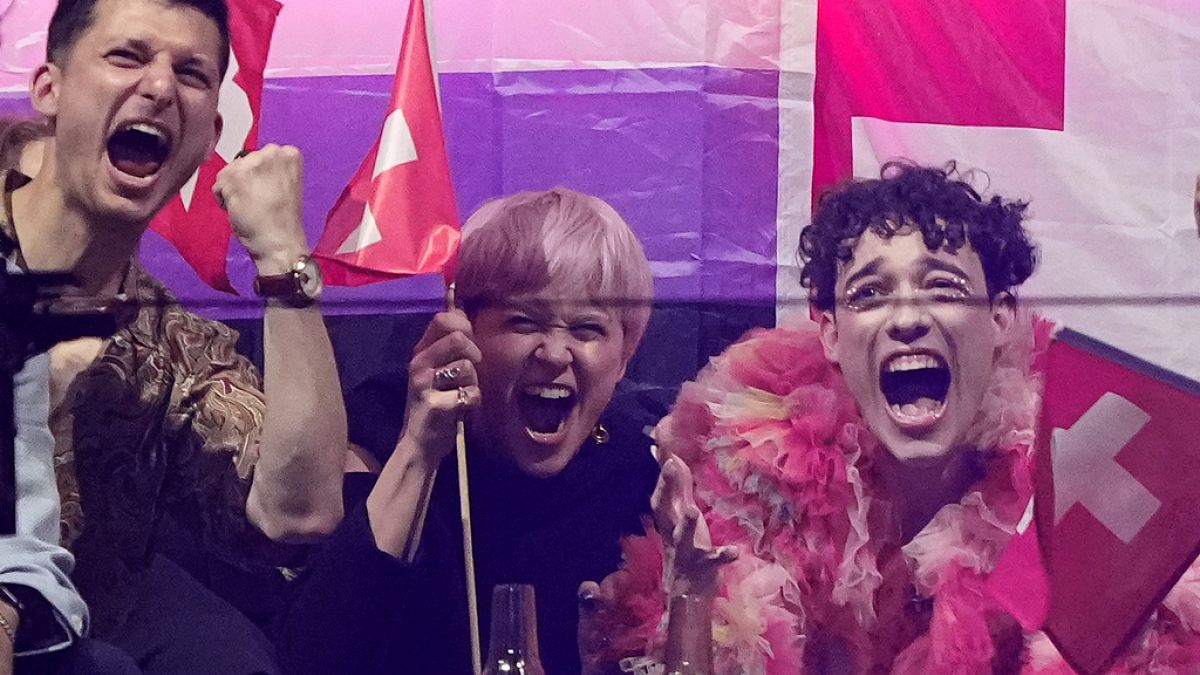The most controversial edition of Eurovision has come to an end and Switzerland has been crowned the 2024 winner. Here’s what you need to know.
After an edition of Eurovision marred in controversy over Israel’s inclusion and anti-Israel protests, as well as the Netherlands’ last-minute exclusion, Switzerland and its representative Nemo has emerged victorious over the 25 songs selected for the final.
Favourites for victory included Croatia, Ukraine, Ireland and Portugal, but Switzerland reigned supreme.
Nemo’s song ‘The Code’, which was one of our favourites here at Euronews Culture, was an immediate winner, and everything tonight – from the theatrical performance and delivery – was perfect. It was quite the unanimous pick from the juries and garnered enough points from the public to pip Croatia to the post.
This is the third victory for Switzerland, who previously won the very first edition back in 1956, and in 1988 with Celine Dion.
Find out more about Nemo here.
Here is the Top 5 in the score board:
- Switzerland – 591 points
- Croatia – 547 points
- Ukraine – 453 points
- France – 445 points
- Israel – 375 points
Israel got a shock 338 points from the audience, which temporarily put them in the lead. They ended up fifth.
The bottom 5 were Georgia, Spain, Slovenia, Austria and last place to Norway. (The UK was the only country to have received nul points from the audience.)
As you can see, we didn’t do too badly with our predictions – with 3 of our 5 picks making the Top 5. 12 points to Euronews Culture, and all that.
So, United By Music, as the Eurovision slogan goes? Not so much this year. Controversy reigned throughout, even during the final ceremony.
Martin Österdahl, Eurovision’s executive supervisor, was booed by the audience as he confirmed that tonight’s voting had been verified – due to the EBU’s decision to eliminate the Dutch contestant Joost Klein earlier in the day. And when Israel announced its points, the audience were audibly booing.
Earlier in the day; police were pushing back pro-Palestinian demonstrators around the Malmö Arena. More than a hundred demonstrators waved flags and chanted “Free Palestine”. Climate activist Greta Thunberg was among them – but stayed clear of the altercations between the most aggressive protesters and the large police contingent.
But a winner has been crowned, and we can wave goodbye to arguably the most tumultuous Eurovision in recent history. At least we got that ABBA ‘Waterloo’ cover from past Eurovision winners Charlotte Perelli (1999), Conchita Wurst (2014), and Carola (1992). That did make things better, even if it would have been nice to see ABBA grace the stage. Instead, we got a pre-recorded message from the band, represented by the ABBA-tars from their virtual Voyage concert in London.
“Eurovision too requires occasional adjustments.”
The atmosphere turned tense when attendees were informed that non-binary flags were prohibited from entering the venue—an edict Nemo strongly opposed during a press conference held after their victory.
Nemo, the inaugural non-binary champion in Eurovision annals, expressed disbelief at this stance.
“I had to discreetly bring my flag because Eurovision forbade it, but I proceeded nonetheless, hoping others did the same,” they explained. “Yet, this glaringly exposes a double standard.”
The vocalist, who accidentally damaged their trophy upon being crowned victor, added: “The trophy can be mended—perhaps Eurovision too requires occasional adjustments.”
Nemo garnered spirited applause and cheers from the assembled journalists in the conference chamber.
They went on to describe their experience as “profoundly testing,” acknowledging that it wasn’t entirely smooth-sailing.
Addressing the press, Nemo reflected: “There were numerous occasions devoid of love and unity, which deeply saddened me, yet paradoxically… there was also an abundance of love here.”
Nemo advocated for “greater compassion” and “empathy,” dedicating their triumph to “those bold enough to embrace their true selves and those whose voices must be acknowledged and understood.”
Hidden messages and Palestine protests
Eurovision enthusiasts believe they’ve uncovered a hidden message from Ireland’s Bambie Thug during her performance in the Eurovision final.
The “ouji pop” artist, who presented the gothic piece “Doomsday Blue,” amassed 136 points, securing a respectable sixth place.
Prior to the competition, Bambie expressed concerns about the decision not to exclude Israel, likening it to Russia’s exclusion two years earlier.
They accused organisers of failing to support them amidst a dispute with Israel during the event.
“Yeah, so Kan, the broadcaster, incited violence against me twice, three times. We raised this issue with the EBU. They assured us they would investigate,” Bambie remarked.
Israel’s performance was also marred with booing from audience members, with Greta Thunberg, who had joined pro-Palestinian protests outside the arena in Malmö, being removed by police.
Here are the key takeaways – and plenty of pics – from Euronews Culture’s live-blog of the 2024 Eurovision Song Contest:

